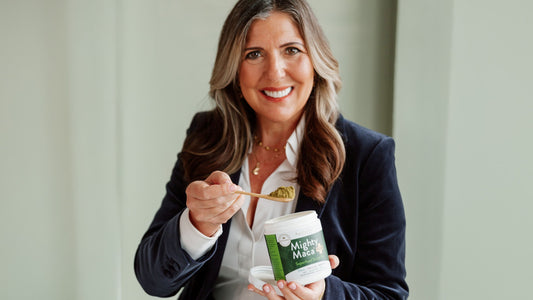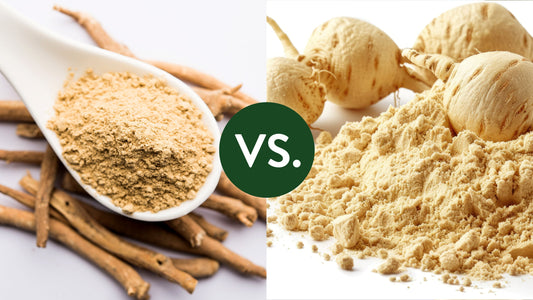Mental health in menopause can be such a struggle. For many women, the first time they start feeling depressed or anxious in their lives is during perimenopause, and for others, post menopause is a time of mental health challenges, too. If that’s you, please know you are not alone.
While I wish I could wrap you in a giant hug right now, this article will have to suffice.
I hope this information helps you find peace if you feel like you’ve lost your way — and gets you back to feeling like yourself again, quickly.
If you’ve reached this article because you’re struggling with depression, anxiety, or suicidal thoughts, call SAMSHA’s hotline at 800-662-4357. SAMHSA’s National Helpline is a free, confidential, 24/7, 365-day-a-year treatment referral and information service (in English and Spanish) for individuals and families facing mental health crises and/or substance use disorders. You can also visit their website here.
Mental Health In Menopause
Struggles with mental health in menopause are real.
For one thing, many women experience difficulty sleeping when they hit perimenopause and beyond. (1) And lack of quality sleep can certainly mess with your mood.
Then there are the changes to your physique like weight gain and hair loss that can also really mess with your confidence and your mood, too.
But it’s not just the bouts of sleepless nights and growing midsection that affect your mental health in menopause.
You see, even the slightest change in hormone levels can affect your mood. And in menopause, large changes in your hormones are occurring. That means your hormones could be causing you to feel:
- Angry
- Frustrated
- Overwhelmed with even small things
- Depressed
- Anxious
- Sad
- Weepy
- Forgetful
- Foggy or less mentally “sharp” than you used to feel
This is why we need to talk about mental health and menopause. Because it’s not you. It’s your hormones. Which is great news, because that means you have tools at your fingertips that can help you feel like yourself again. I’ll cover all of those in this article, so keep reading!
Can Menopause Cause Depression And Anxiety?
Can menopause cause depression and anxiety? Absolutely. Studies indicate that menopause is associated with higher rates of both anxiety and depression in women. (2-5)
In fact, by some estimates, depression and anxiety in menopause affect up to 50% of women. (6)
Menopause And Depression
So, we know that the menopause and depression are often related. Perimenopausal depression and postmenopausal depression are common as well. Research indicates you’re most likely to experience depression while you’re going through the menopausal transition and just after you’ve stopped getting your period for an entire year. (6) This is an extremely long time frame, just to be clear. Some women begin experiencing perimenopause as early as age 35 and may not experience true menopause until they are over 50 years old.
Menopause depression symptoms are often very similar to the symptoms women chalk up to menopause.
That means symptoms like:
- Fatigue
- Low energy
- Difficulty sleeping
- Oversleeping in the morning
- Struggles concentrating
- Feelings of guilt or regret
- Lack of interest in usual activities
- Persistent low mood
- Anger or irritability
- Changes to appetite
- Suicidal thoughts
- Digestive problems
- Low libido
- Headaches
- Weight gain
Could actually be depression that’s being caused by changes to your hormone levels. If you’re experiencing these kinds of symptoms, and especially if they last for more than 2 weeks, it’s important to consider the fact that it could be more than just a menopausal mood swing.
Anxiety Attack Menopause
Anxiety in menopause is very similar to depression, in that a lot of women in the menopausal transition experience it, and yet they just think “Well, that’s how things are for women my age.”
But I’m here to tell you — while menopause and anxiety may go hand in hand, this is not something you just have to deal with.
Let’s talk about what menopause anxiety feels like, because there seems to be some confusion about the word ‘anxiety.’ Anxiety doesn’t have to be a panic attack or a full-blown meltdown.
Anxiety and menopause symptoms include:
- Feeling unsettled, nervous, tense
- Worrying about something specific…or feeling worried, but you’re not sure why
- Increased heart rate
- Fatigue
- Weakness
- Trouble concentrating, especially when you’re worried about something
- Sleep troubles
- Avoiding activities that trigger your anxious feelings
- Gastrointestinal trouble
Some women specifically complain about menopause anxiety in the morning. They feel most tense and worried when they first wake up.
How To Overcome Menopause Depression And Anxiety
Since so many of the common symptoms of menopause include depression and anxiety symptoms, you may not be surprised to learn that what helps anxiety during menopause is exactly what helps you feel better in menopause, to begin with.
Here are some of the most important facets of a battle plan to keep your mental health in check during menopause.
Diet For Mental Health
Yes, research indicates that what you eat can affect your mental health. (8,9)
Ideally, a good diet for depression is one that includes:
-
Plenty of healthy fats (because fats are brain food and they’re important for hormone production!)
- Loads of alkalinizing vegetables (the fiber and nutrients in veggies help your hormones, any gastrointestinal upset you may be experiencing, and they help you shed weight, too)
It’s also important to limit processed foods, flours, and refined sugars when you’re trying to minimize mental health struggles in menopause. These types of foods can encourage inflammation, which only serves to complicate mental health conditions and hormonal issues.
If you’re looking for a great diet that’s ideal for both menopause and mental health, be sure to check out my book, The Hormone Fix for a complete, easy-to-follow plan with tons of simple recipes.
Exercise For Depression
If there’s one magic pill for your hormones and your mental health, it’s exercise. Which is one of those really difficult things for many women with mental health issues. Because who feels like exercising when you’re sad, anxious, exhausted, or frustrated?
Here’s the thing though. If you can muster up the strength to get your body moving, if you can just move through the pain and the sadness, it can create a ripple effect that will impact your body, your mind, and your mood.
- Exercise helps lower cortisol, which is a hormone that is often elevated in women with anxiety and depression. (10,11)
- Exercise also helps you control your blood sugar. Which is important, because insulin resistance doubles your risk of developing depression. (12)
- Exercise improves your sleep quality, which in turn can help just about every bit of your body. (13)
- Exercise releases endorphins, which are feel-good chemicals that flood the brain. (14)
Make Time For Those Oxytocin Moments
Oxytocin is also known as the love hormone. It’s a hormone of connection. And it’s a very powerful force in your body.
You can experience a wave of oxytocin simply by hugging someone for more than a few seconds, cuddling, or having sex.
When you prioritize those moments of joy and connection with other humans you love, the oxytocin created opposes inflammation, and cortisol — and as a result makes you feel more relaxed and happy. Basically, when you’re under the influence of oxytocin, it’s harder for those depression and anxiety chemicals to get a hold of your brain.
Keep Your Hormones In Check
At the root of this mental health in menopause struggle is usually your waning levels of sex hormones.
When you’re ovulating regularly, and you’re getting your period, your hormones, especially progesterone and estrogen, are in good supply.
But as your cycle becomes more sporadic and your hormone levels drop as a result…your whole body feels the difference, including your brain. For example, progesterone is usually a calming force in your body and your brain. So without plentiful amounts of this hormone circulating regularly, other hormones like cortisol can go unchecked and contribute to those feelings of depression and anxiety in menopause.
There are a few ways to help encourage the production of your hormones when your ovaries stop providing an ample supply of them.
1. Adrenal Support In Menopause
Make sure you’re leveraging the power of your adrenal glands. When your adrenals are even slightly compromised — due to stress, lack of sleep, too much caffeine, or even too little exercise, they focus on producing cortisol. And as we’ve seen, cortisol is the enemy of mental health in menopause.
So you want to make sure you’re nourishing and supporting your adrenals so they can focus on producing sex hormones and DHEA, which gets turned into hormones by your body. In this way, your body can sort of make up for the fact that your ovaries are churning out fewer sex hormones. And you can feel much more like yourself as a result.
2. The Importance Of Progesterone For Mental Health
I touched on this earlier, but progesterone is a hormone that is typically produced by your body after you ovulate. If you’re not ovulating, that means you’re getting less progesterone than your body and your brain like to have circulating.
Progesterone is really an important hormone for mental health because it calms everything down. It helps oppose cortisol if your adrenals are in cortisol-production mode.
And progesterone also helps oppose estrogen. Here’s the really crazy thing about estrogen. Yes, in menopause your levels of estrogen are declining. But, in a lot of women, progesterone declines even more than estrogen does. So you start to see estrogen dominance, even in women going through perimenopause. Estrogen dominance can make you feel angry, irritated, and cranky.
This is why it’s important to encourage your body’s production of progesterone by eating plenty of healthy fats, and making sure you get lots of magnesium and vitamin C in your diet.
3. DHEA And Mental Health In Menopause
Dehydroepiandrosterone (DHEA) is a hormone that your body uses to synthesize other hormones, like estrogen, progesterone, and testosterone.
Because DHEA is a building block for your sex hormones, by supporting the production of this crucial hormone, you can give your body what it needs to churn out hormones when your ovaries are producing less.
How do you encourage DHEA? You can make sure you’re exercising regularly, and eating lots of those healthy fats in foods like wild-caught salmon, avocados, and olive oil.
The Ultimate Menopause Solution
The Menopause Kit takes your toughest menopause struggles and gives your body support in all the right ways to promote adrenal health, progesterone, and DHEA — naturally.
Instead of pumping your body full of synthetic hormones, The Menopause Kit helps give your body the building blocks it needs to make its own again.
When you’re suffering and in the depths of mental health struggles, sometimes your body just needs a little extra support to get to a place where you can focus on eating the right foods and getting plenty of exercise.
I designed The Menopause Kit with herbs, natural ingredients, and bioidentical hormones to give you that support.
Learn more about The Menopause Kit here.
Mental Health In Menopause
My wish is for no woman to struggle with mental health in menopause. Having been through the depths of mental health challenges myself, I know how lost and isolated you feel.
Please know you are not alone, and I hope you remember that you are worthy of feeling like your best self, no matter what.
References
- https://www.ncbi.nlm.nih.gov/pmc/articles/PMC6092036/
- https://www.ncbi.nlm.nih.gov/pmc/articles/PMC6226029/
- https://www.ncbi.nlm.nih.gov/pmc/articles/PMC10088347
- https://www.ncbi.nlm.nih.gov/pmc/articles/PMC3641149/
- https://www.ncbi.nlm.nih.gov/pmc/articles/PMC10086901
- https://www.ncbi.nlm.nih.gov/pmc/articles/PMC10086901/
- https://www.ncbi.nlm.nih.gov/pmc/articles/PMC3584692/
- https://www.ncbi.nlm.nih.gov/pmc/articles/PMC7084175/
- https://pubmed.ncbi.nlm.nih.gov/30254236/
- https://www.ncbi.nlm.nih.gov/pmc/articles/PMC3424606/
- https://www.ncbi.nlm.nih.gov/pmc/articles/PMC6987444/
- https://ajp.psychiatryonline.org/doi/10.1176/appi.ajp.2021.20101479
- https://www.ncbi.nlm.nih.gov/pmc/articles/PMC4341978/
- https://link.springer.com/article/10.2165/00007256-198401020-00004



